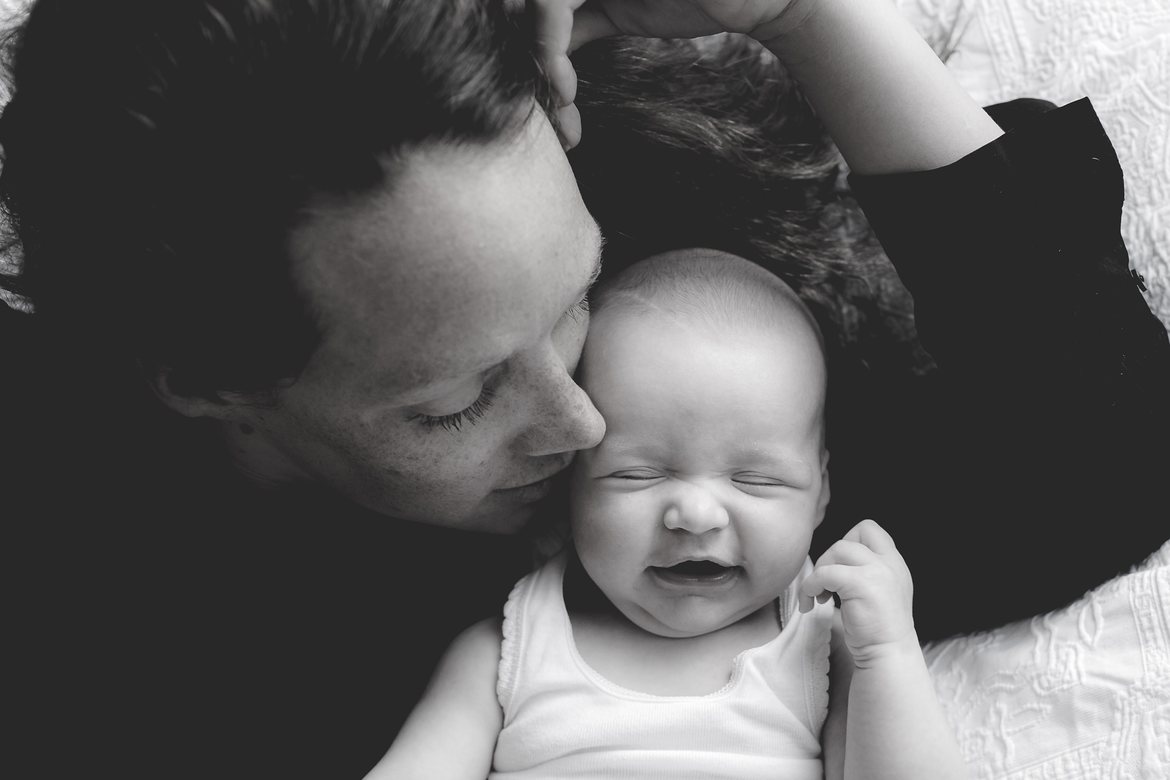By Mary Francell
Regressions. White noise machines. Charts of sleep needs by age. Wearable blankets. Sleep trackers. Today’s parents, at least those in WEIRD societies (yes, that’s an actual term in anthropology – Western, Educated, Industrialised, Rich and Democratic) are overloaded with information and choices about where and how much babies sleep. This obsession promotes so much unnecessary anxiety and stress – no wonder parents have trouble sleeping!
“Is your baby sleeping through the night?” may be the most common question heard by Western parents. And when the answer is “no” or “for a while, but now they are waking up again,” parents often worry something is wrong with their baby. But here’s the thing – it’s biologically normal for babies to wake at night. Heck, it’s normal for adults – we get up to use the toilet, adjust blankets or even just roll over.
Waking at night is protective
For young babies, night waking is actually protective. Humans have the largest brains of any primate in relation to our size and our infants are born less mature so their heads fit through the birth canal. One result of this immaturity is an underdeveloped breathing system – and some SIDS researchers theorise that vulnerable babies may sleep so long and so deeply that they “forget” to breathe.
This may be why babies sleep less deeply and have shorter sleep cycles than adults – and why trying to “train” an infant to sleep more like an adult may be risky.
It’s also why sharing sleep with a baby is important – a parent’s breathing and movements at night keep an infant from sleeping too deeply.
In addition, babies’ brains and bodies are growing incredibly fast, which sometimes makes it hard to stay asleep! The dreaded “sleep regression” is misnamed – it’s actually a developmental progression as an infant who had been sleeping longer stretches starts to wake more frequently. They may be becoming more aware of their surroundings or getting ready to crawl or any one of the other mental and physical milestones children progress through during the first few years of life.
So you may be thinking – OK, that’s fine, but I’m tired! How can I get a better night’s sleep?
First, don’t look at the clock or your phone and forget the sleep trackers – trust me, it helps not to know! And don’t worry if your child doesn’t sleep the average for their age – like adults, they all have individual sleep needs. Remember, you can’t make a baby sleep – you can only provide a calming atmosphere that is conducive to sleep. If your child truly seems sleep deprived (rubbing eyes constantly, looking dazed, etc.), try winding down earlier in the evening (see my post Bedtime is Overrated) or lying down with them in a quiet, childproof room during the day – even if they don’t nap, the rest time is restorative.
Second, share sleep with your baby (and toddler)! Make your bed a safe space (see How to Sleep Safely with your Baby) and work on getting comfortable in the cuddle curl so you can nurse without waking completely. An extra pillow under your head and one between your knees can make a world of difference. If baby likes to sleep with your nipple in their mouth all night and you find that uncomfortable, try easing it out (a finger in the corner of the mouth helps) when they are in a deep sleep and press up on their chin to keep their mouth closed for a minute or two.
Putting your top leg down on the bed and leaning over to nurse from the top breast sometimes can help stretch out your back.
And don’t feel you need to sleep in one position the whole night – the cuddle curl is safest when infants are tiny, but even then many parents don’t stay like that the whole night. They roll on their backs for a while or turn over and stretch. For parents who bottle feed, having baby next to the bed in a co-sleeper or sidecar crib for at least the first four months makes it easier to put in a pacifier/dummy and pat baby’s back.
Stay horizontal
Are you sensing a pattern here? Staying horizontal is key! Some parents have heard that they shouldn’t let their baby fall asleep nursing or that they should put an infant down drowsy but awake. This may work for a few unicorn babies, but human milk contains melatonin, tryptophan and other substances that promote sleepiness. Nursing to sleep is biologically normal and often much easier than rocking or bouncing in the middle of the night.
If you already rock or bounce your little one to sleep, see if you can transition to back to nursing or something else you can do lying down. Patting or rubbing, shushing or humming, letting baby suck on your finger, or rocking baby’s bum may help. Patting and humming while breastfeeding can also be helpful if you will be going back to work or school and someone else will be helping baby sleep – your child will associate these other sleep cues with the comfort of nursing.
And remember – you don’t have to get baby back to sleep every time they wake. If they aren’t upset and don’t want to nurse, it’s fine to let bubs babble and roll around a bit until they are ready to doze off again. Take this time to breathe deeply and relax, which can be almost as restorative as sleep.











